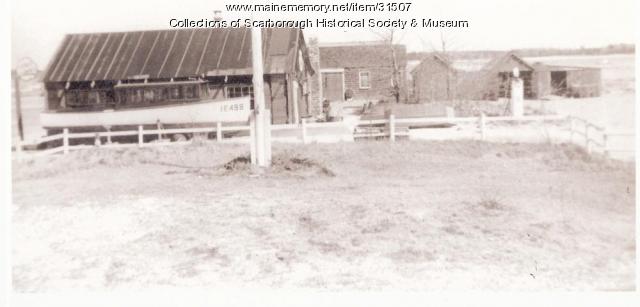Keywords: Maritime Maritime industries Shipping
Item 99324
Launching of schooner "Theoline #1," Belfast, 1900
Contributed by: Belfast Historical Society Date: 1900 Location: Belfast Media: Photographic print
Item 101265
William Ellery on shipping fees, Newport, Rhode Island, 1789
Contributed by: Maine Historical Society Date: 1789-08-29 Location: Newport, RI Media: Ink on paper
Exhibit
The Schooner Bowdoin: Ninety Years of Seagoing History
After traveling to the Arctic with Robert E. Peary, Donald B. MacMillan (1874-1970), an explorer, researcher, and lecturer, helped design his own vessel for Arctic exploration, the schooner <em>Bowdoin,</em> which he named after his alma mater. The schooner remains on the seas.
Exhibit
Britain was especially interested in occupying Maine during the Colonial era to take advantage of the timber resources. The tall, straight, old growth white pines were perfect for ships' masts to help supply the growing Royal Navy.
Site Page
Scarborough: They Called It Owascoag - Maritime Tales: Shipyards and Shipwrecks - Page 2 of 2
"… to Peter Dow Bachelder in his book Ships and Maritime Disasters of the Maine Coast, the ship was the largest wooden sailing ship ever wrecked off…"
Site Page
Scarborough: They Called It Owascoag - Maritime Tales: Shipyards and Shipwrecks - Page 1 of 2
"Maritime Tales: Shipyards and Shipwrecks Text by Bruce Thurlow Images from Scarborough Historical Society, Rodney Laughton and Don Googins…"
Story
Maine and the Atlantic World Slave Economy
by Seth Goldstein
How Maine's historic industries are tied to slavery
Story
An enjoyable conference, Portland 2021
by John C. Decker, Danville, Pennsylvania
Some snippets from a 4-day conference by transportation historians in Portland, September 7-11, 2021
Lesson Plan
Primary Sources: The Maine Shipyard
Grade Level: 9-12
Content Area: Social Studies
This lesson plan will give students a close-up look at historical operations behind Maine's famed shipbuilding and shipping industries. Students will examine primary sources including letters, bills of lading, images, and objects, and draw informed hypotheses about the evolution of the seafaring industry and its impact on Maine’s communities over time.
Lesson Plan
Becoming Maine: The District of Maine's Coastal Economy
Grade Level: 3-5
Content Area: Social Studies
This lesson plan will introduce students to the maritime economy of Maine prior to statehood and to the Coasting Law that impacted the separation debate. Students will examine primary documents, take part in an activity that will put the Coasting Law in the context of late 18th century – early 19th century New England, and learn about how the Embargo Act of 1807 affected Maine in the decades leading to statehood.














